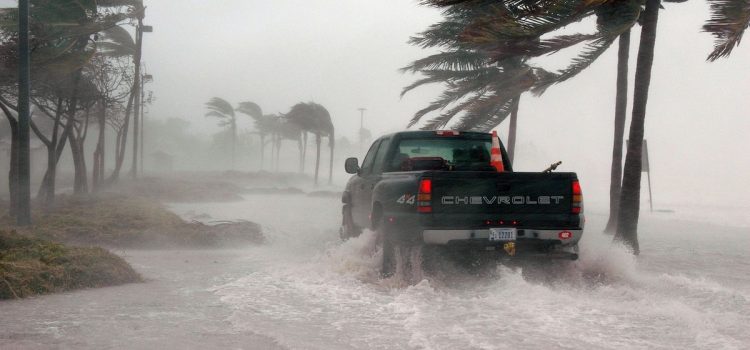

This article is an excerpt from the Shortform book guide to "False Alarm" by Bjørn Lomborg. Shortform has the world's best summaries and analyses of books you should be reading.
Like this article? Sign up for a free trial here.
Does global warming cause extreme weather? Are floods, droughts, fires, and hurricanes worse than ever? If so, what’s the cause?
Bjorn Lomborg writes that climate alarmists all echo the same sentiment: Climate change leads to more extreme weather. Opposing this view, he argues that climate change has had relatively little impact on extreme weather.
Keep reading to understand how Lomborg arrives at this conclusion.
Does Global Warming Cause Extreme Weather?
Does global warming cause extreme weather? To answer this question, Lomborg examines droughts, flooding, wildfires, and hurricanes.
(Shortform note: Since 1991, an average of 189 million people each year have been impacted by extreme weather, which experts say has been worsened by climate change. In response, climate activists have even implemented policies to compensate victims of this weather. For instance, UN negotiators established a fund to compensate poor countries that are disproportionately harmed by extreme weather primarily caused by rich countries’ pollution.)
First, Lomborg disputes the claim that climate change has worsened droughts worldwide. He cites the UN’s panel of climate scientists, who found the earth isn’t experiencing more drought worldwide since 1950. Similarly, the United States’s National Climate Assessment found that, in the U.S., long-term increases in precipitation have actually decreased droughts.
(Shortform note: Since False Alarm’s publication in 2020, the UN’s analysis of droughts has changed. In fact, the UN’s 2022 report suggests that droughts have increased in severity and frequency by about 30% since 2000. However, they don’t explicitly say whether these droughts are the result of human-induced climate change.)
Second, Lomborg says alarmists claim that climate change has increased flooding. Refuting this claim, he cites the UN’s scientists, who concluded there’s little evidence floods are increasing in severity or frequency. Lomborg concedes that climate change causes increased precipitation, increasing the risk of flooding in the future. But, UN scientists recognize flooding is highly linked to river management, so improved river management could mitigate this risk.
(Shortform note: To mitigate flooding, experts recommend a variety of approaches for governments. One obvious approach involves improving floodgates and levees so that rivers don’t flood as frequently. However, other approaches include governmental purchases of high-risk properties so people move toward lower-risk areas, or building elevated structures less susceptible to flooding.)
Third, Lomborg addresses the claim that climate change causes destructive wildfires by pointing out that wildfires have burnt 25% less land globally in the last 18 years as fire management has improved. Nonetheless, he concedes that some areas, like the western United States, have experienced more wildfires from rising temperatures. From a historical perspective, however, this increase is modest—while seven million acres of U.S. land burned in the 2010s, 39 million acres burned in the 1930s. So, though climate change increases wildfires in some areas, its impact is smaller than some suggest.
(Shortform note: One crucial strategy to reduce wildfires is prescribed burning. This involves creating small-scale wildfires which burn hazardous materials, like dry kindling and dead trees, that could otherwise allow natural wildfires to spread rapidly.)
Finally, Lomborg denies the claim that climate change causes more frequent and catastrophic hurricanes. He again appeals to the UN’s climate scientists, who recently concluded that hurricanes are not getting more frequent—except in the North Atlantic. However, Lomborg notes that they attributed this increase to air pollution, not anthropogenic climate change.
(Shortform note: Despite the findings of UN climate scientists, a different 2019 study concluded that we can’t explain hurricane activity in the North Atlantic by air pollution alone. Consequently, this opens the possibility that human-induced climate change has affected hurricane activity.)
Admittedly, the financial cost of hurricanes has increased exponentially. But Lomborg argues that this stems from increased development in areas at risk of hurricanes; since 1900, for example, the coastal population of Florida has increased 67-fold. So, climate change itself isn’t responsible for this increased damage.
(Shortform note: In Florida, nearly 40% of those moving into the state are retirees. Experts observe that these retirees often lack smartphones, making it more difficult to communicate evacuation plans to them during hurricanes. So, Florida’s older population may also contribute to increasing damage and death tolls from hurricanes.)
On the whole, Lomborg concludes that climate change doesn’t heavily impact extreme weather.

———End of Preview———
Like what you just read? Read the rest of the world's best book summary and analysis of Bjørn Lomborg's "False Alarm" at Shortform.
Here's what you'll find in our full False Alarm summary:
- Why climate change isn't as cataclysmic as people think
- The unintended costs that come with climate activists’ proposed approaches
- A look at the most promising approaches to climate change






